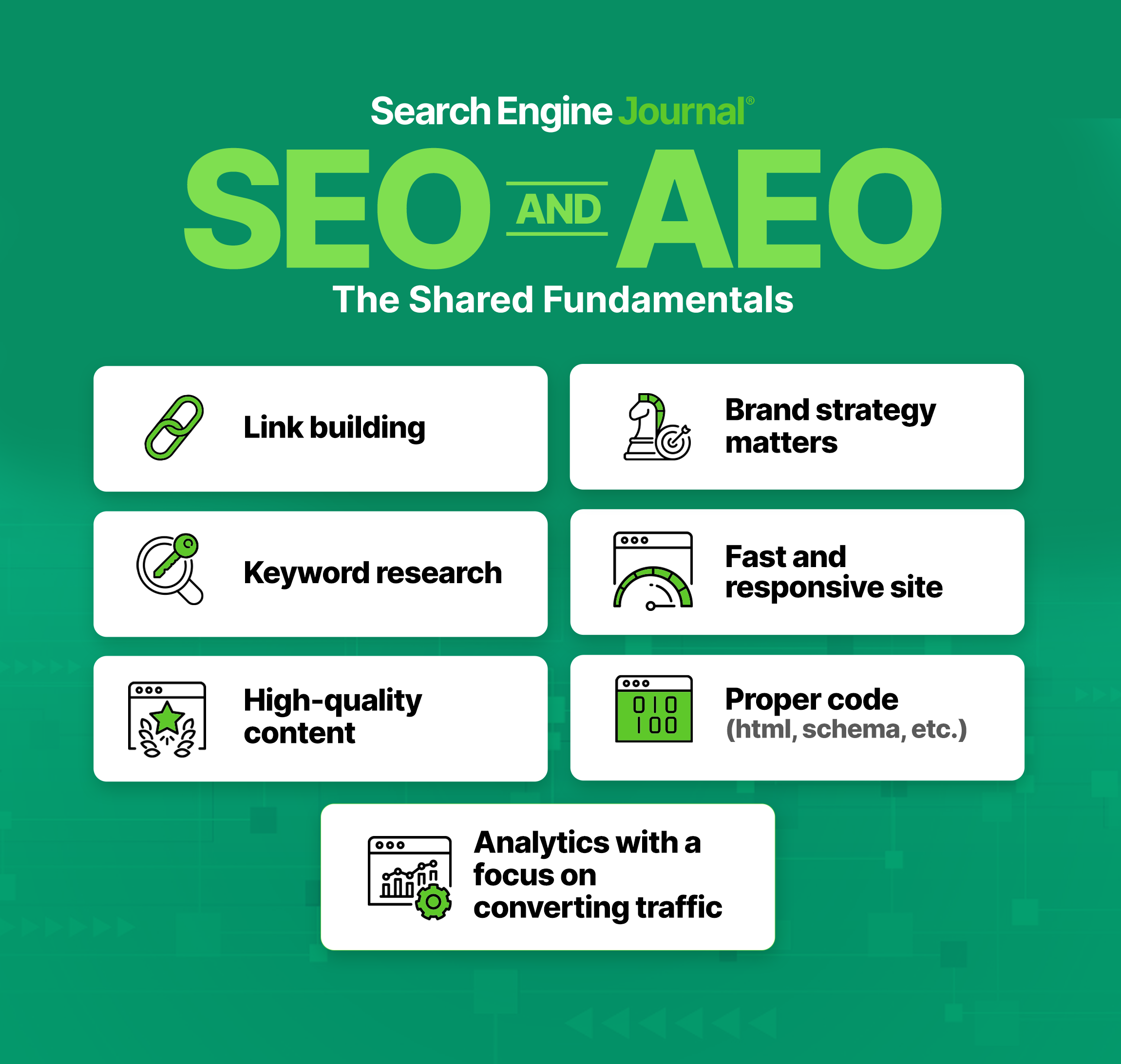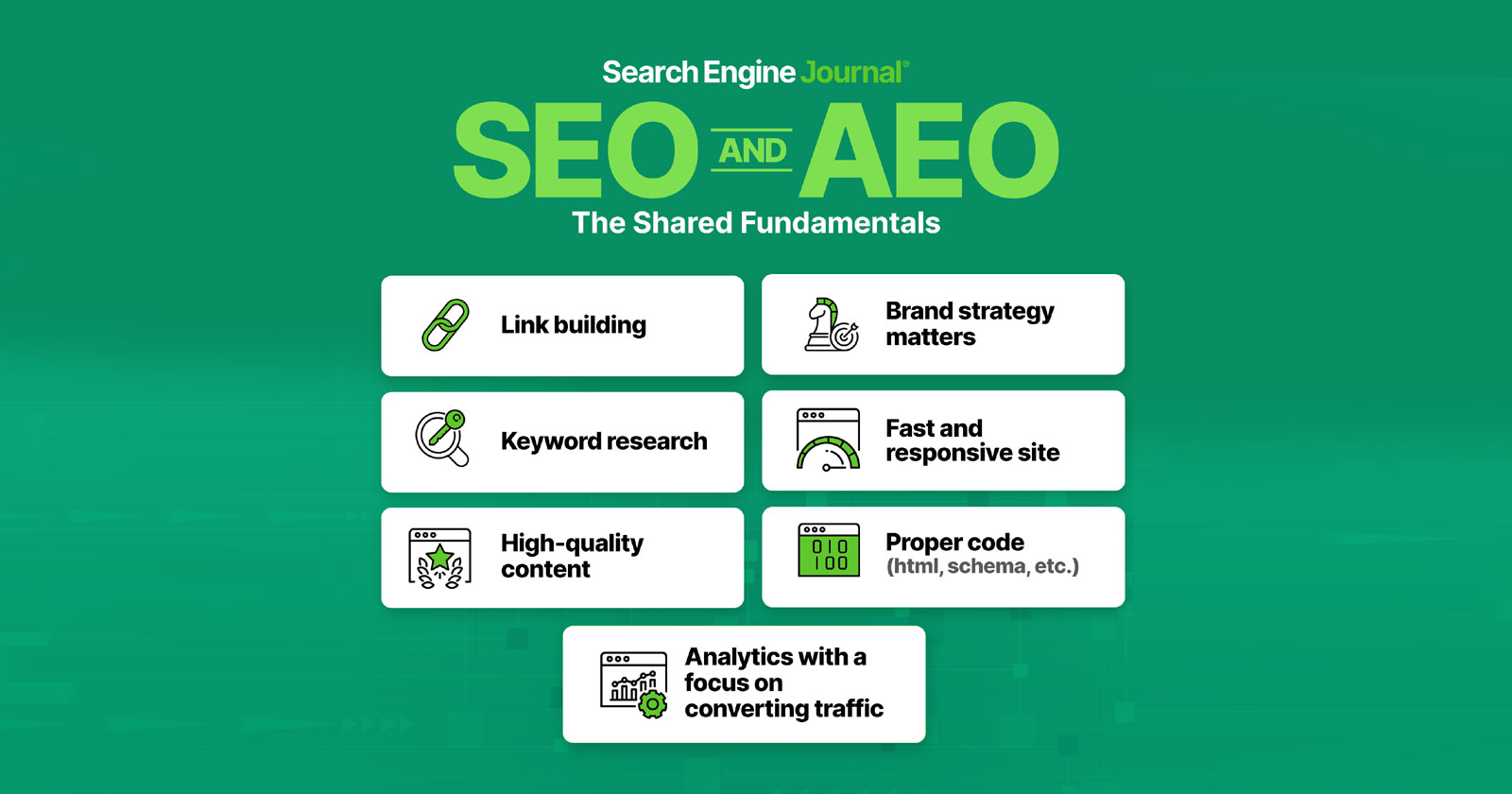Todd Friesen, one of the most experienced digital marketers in our industry, recently posted on LinkedIn that the core fundamentals that apply to traditional search engines work exactly the same for AI search optimization. His post quickly received dozens of comments and more than a hundred likes, indicating that he’s not the only one who believes there’s no need to give SEO another name.
Who Is Todd Friesen?
Todd has had a long career in SEO, formerly of Salesforce and other top agencies and businesses. Like me, he was a moderator at the old WebmasterWorld Forums, only he’s been doing SEO for even longer. Although he’s younger than I am, I totally consider him my elder in the SEO business. Todd Friesen, along with Greg Boser, was an SEO podcasting pioneer with their SEO Rockstars show.
AEO – Answer Engine Optimization
There’s been a race to give a name to optimizing web content for AI search engines and few details on why it merits a new name.
We find ourselves today with five names for the exact same thing:
- AEO (Answer Engine Optimization)
- AIO (AI Optimization)
- CEO (Chat Engine Optimization)
- GEO (Generative Engine Optimization)
- LMO (Language Model Optimization)
There are many people today that agree that optimizing for an AI search engine is fundamentally the same as optimizing for a traditional search engine. There’s little case for a new name when even an AI search engine like Perplexity uses a version of Google’s PageRank algorithm for ranking authoritative websites.
Todd Friesen’s post on LinkedIn made the case that optimizing for AI search engines is essentially the same thing as SEO:
“It is basically fundamental SEO and fundamental brand building. Can we stop over complicating it?
– proper code (html, schema and all that)
– fast and responsive site
– good content
– keyword research (yes, we still do this)
– coordination with brand marketing
– build some links
– analytics and reporting (focus on converting traffic)
– rinse and repeat”
SEO For AI = The Same SEO Fundamentals
Todd Friesen is right. While there’s room for quibbling about the details the overall framework for SEO, regardless if it’s for an AI search engine or not, can be reduced to these seven fundamentals of optimization.
Digital Marketer Rosy Callejas (LinkedIn Profile) agreed that there were too many names for the same thing:
“Too many names! SEO vs AEO vs GEO”
Kevin Doory, (LinkedIn Profile) Director Of SEO at RazorFish commented:
“The ones that talk about what they do, can change the names to whatever they want. The rest of us will just do the darn things.”
SEO Consultant Don Rhoades (LinkedIn Profile) agreed:
“Still SEO after all these (failed) attempts to distance from it by “thought leaders” – eg: inbound marketing, growth hacking, and whatever other nomenclature du jour they decide to cook up next.”
Ryan Jones (LinkedIn Profile), Senior Vice President, SEO at Razorfish (and founder of SERPrecon.com) commented on the ridiculousness of the GEO name:
“GEO is a terrible name”
Pushback On AEO Elsewhere
A discussion on Bluesky saw Google’s John Mueller commenting on the motivations for creating hype.
Preeti Gupta posted her opinion on Bluesky:
“It is absolutely wild to me that in this debate of GEO/AEO and SEO, everyone is saying that building a brand is not a requisite for SEO, but it is important for GEO/AEO.
Like bro, chill. This AI stuff didn’t invent the need for building a brand. It existed way before it. smh.”
Google’s John Mueller responded:
“You don’t build an audience online by being reasonable, and you don’t sell new things / services by saying the current status is sufficient.”
What Do You Think?
What’s your opinion? Is SEO for AI fundamentally the same as for regular search engines?






![We Figured Out How AI Overviews Work [& Built A Tool To Prove It]](https://www.searchenginejournal.com/wp-content/uploads/2025/04/sidebar1x-185.png)